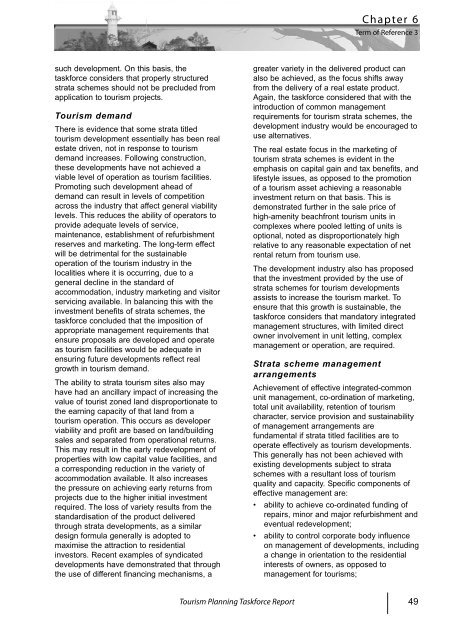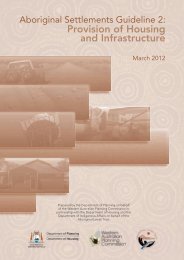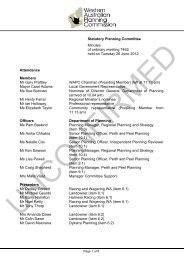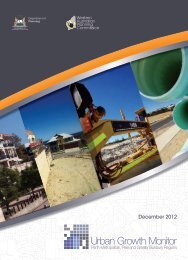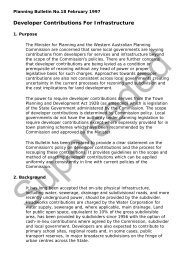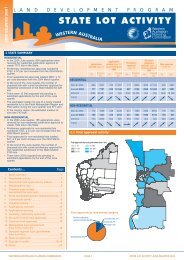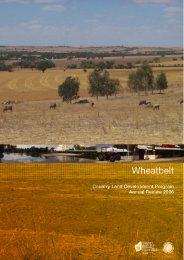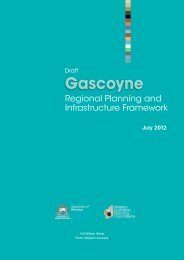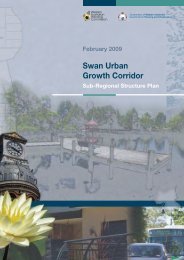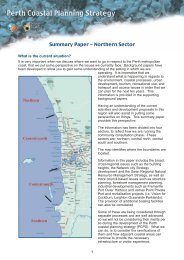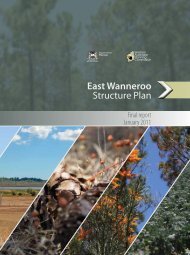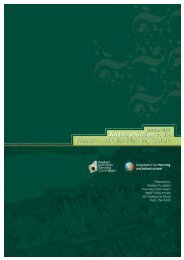Tourism Planning Taskforce Report - Western Australian Planning ...
Tourism Planning Taskforce Report - Western Australian Planning ...
Tourism Planning Taskforce Report - Western Australian Planning ...
- No tags were found...
Create successful ePaper yourself
Turn your PDF publications into a flip-book with our unique Google optimized e-Paper software.
Chapter 6Term of Reference 3such development. On this basis, thetaskforce considers that properly structuredstrata schemes should not be precluded fromapplication to tourism projects.<strong>Tourism</strong> demandThere is evidence that some strata titledtourism development essentially has been realestate driven, not in response to tourismdemand increases. Following construction,these developments have not achieved aviable level of operation as tourism facilities.Promoting such development ahead ofdemand can result in levels of competitionacross the industry that affect general viabilitylevels. This reduces the ability of operators toprovide adequate levels of service,maintenance, establishment of refurbishmentreserves and marketing. The long-term effectwill be detrimental for the sustainableoperation of the tourism industry in thelocalities where it is occurring, due to ageneral decline in the standard ofaccommodation, industry marketing and visitorservicing available. In balancing this with theinvestment benefits of strata schemes, thetaskforce concluded that the imposition ofappropriate management requirements thatensure proposals are developed and operateas tourism facilities would be adequate inensuring future developments reflect realgrowth in tourism demand.The ability to strata tourism sites also mayhave had an ancillary impact of increasing thevalue of tourist zoned land disproportionate tothe earning capacity of that land from atourism operation. This occurs as developerviability and profit are based on land/buildingsales and separated from operational returns.This may result in the early redevelopment ofproperties with low capital value facilities, anda corresponding reduction in the variety ofaccommodation available. It also increasesthe pressure on achieving early returns fromprojects due to the higher initial investmentrequired. The loss of variety results from thestandardisation of the product deliveredthrough strata developments, as a similardesign formula generally is adopted tomaximise the attraction to residentialinvestors. Recent examples of syndicateddevelopments have demonstrated that throughthe use of different financing mechanisms, agreater variety in the delivered product canalso be achieved, as the focus shifts awayfrom the delivery of a real estate product.Again, the taskforce considered that with theintroduction of common managementrequirements for tourism strata schemes, thedevelopment industry would be encouraged touse alternatives.The real estate focus in the marketing oftourism strata schemes is evident in theemphasis on capital gain and tax benefits, andlifestyle issues, as opposed to the promotionof a tourism asset achieving a reasonableinvestment return on that basis. This isdemonstrated further in the sale price ofhigh-amenity beachfront tourism units incomplexes where pooled letting of units isoptional, noted as disproportionately highrelative to any reasonable expectation of netrental return from tourism use.The development industry also has proposedthat the investment provided by the use ofstrata schemes for tourism developmentsassists to increase the tourism market. Toensure that this growth is sustainable, thetaskforce considers that mandatory integratedmanagement structures, with limited directowner involvement in unit letting, complexmanagement or operation, are required.Strata scheme managementarrangementsAchievement of effective integrated-commonunit management, co-ordination of marketing,total unit availability, retention of tourismcharacter, service provision and sustainabilityof management arrangements arefundamental if strata titled facilities are tooperate effectively as tourism developments.This generally has not been achieved withexisting developments subject to strataschemes with a resultant loss of tourismquality and capacity. Specific components ofeffective management are:• ability to achieve co-ordinated funding ofrepairs, minor and major refurbishment andeventual redevelopment;• ability to control corporate body influenceon management of developments, includinga change in orientation to the residentialinterests of owners, as opposed tomanagement for tourisms;<strong>Tourism</strong> <strong>Planning</strong> <strong>Taskforce</strong> <strong>Report</strong>49


